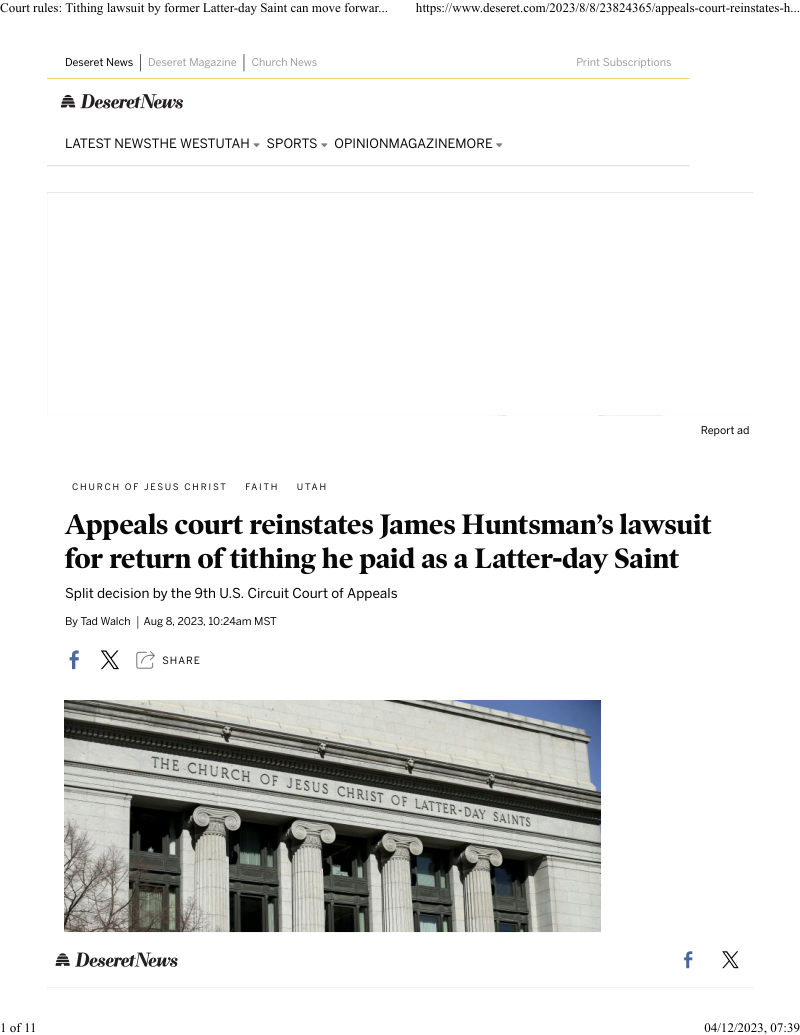Tad Walch reports on the decision of the appeals court to reinstate James Huntsman's lawsuit against the Church.
- Type
- News (traditional)
- Source
- Tad Walch LDS
- Hearsay
- Journalism
- Reference
Tad Walch, "Appeals court reinstates James Huntsman’s lawsuit for return of tithing he paid as a Latter-day Saint," Deseret News, August 8, 2023, accessed December 4, 2023
- Scribe/Publisher
- Deseret News
- Audience
- Reading Public
- Transcription
In a split decision, an appeals court on Monday reinstated part of the case of a man seeking the return of tithing he paid to The Church of Jesus Christ of Latter-day Saints.
By a 2-1 vote, the 9th U.S. Circuit Court of Appeals in San Francisco reversed a lower court’s decision to throw out James Huntsman’s lawsuit over $5 million in tithing he said he paid the church over a quarter of a century.
A U.S. District Court judge granted the church’s motion for summary judgment in September 2021 and dismissed the lawsuit, which alleged the church defrauded its members by using tithing funds for purposes other than charitable purposes. Huntsman’s suit repeated others’ allegations that the church used $1.4 billion in tithing funds to help pay for City Creek Center in downtown Salt Lake City and $594 million in tithing funds to bolster Beneficial Financial Group during the 2008 financial crisis.
Church leaders have maintained that tithing funds are used for religious purposes. The church repeated its position that it used reserve funds in those instances in a statement about Monday’s ruling.
“The Court of Appeals decision returns part of this case to the trial court for further handling,” church spokesman Sam Penrod said. “As we have previously stated, there was no fraud. The church did exactly what President Gordon B. Hinckley said when it invested earnings on reserve funds in the City Creek project. The church looks forward to defending these facts in the next phase of the legal process.”
The church of more than 17 million members maintains reserve funds to cover the operations of hundreds of temples, its global missionary work, more than 30,000 congregations and five colleges and universities.
“In fact, tithing was not used on the City Creek project,” a church spokesman said when Huntsman filed the lawsuit in 2021. “As President Hinckley said in the April 2003 general conference of the church, the funds came from ‘commercial entities owned by the church’ and the ‘earnings of invested reserve funds.’ A similar statement was made by President Hinckley in the October 2004 general conference. Mr. James Huntsman’s claim is baseless.”
Monday’s ruling showed that two judges on the appeals court found there was sufficient reason for a jury to hear Huntsman’s claims.
“We reverse the judgment of the district court with respect to Huntsman’s fraud claim based on the church’s representations as to the use of funds to finance the City Creek Mall project,” Judge William Fletcher wrote. “We affirm the judgment of the district court with respect to Huntsman’s fraud claim as to the use of funds to bail out the Beneficial Life Insurance Company. We reverse and remand for further proceedings consistent with this opinion.”
Fletcher wrote that jurors should consider whether the church used tithing funds or reserve funds for the projects, saying that some church leaders have used the term tithing funds to include both tithing and earnings on tithing in reserve funds. Fletcher said the late President Hinckley didn’t clarify that the church’s reserve funds came from tithing.
The third appeals court judge disagreed.
“(President) Hinckley’s earlier statements show that the church would set aside tithing funds as reserves,” wrote Judge Edward Korman. “This, in addition to the financial records, makes clear that Hinckley’s 2003 statement was truthful and not a misrepresentation. Combined with Huntsman’s sophistication and knowledge of the church, there is also no question that Hinckley would have expected Huntsman to understand his statement, which entirely undermines any claim that Hinckley made a knowingly false representation. Again, this is not a question of what Huntsman understood, but of what Hinckley intended. Thus, no reasonable juror could conclude that the church fraudulently misrepresented the source of the money used to finance the City Creek Mall project.”
The district court judge who threw out the case two years ago agreed with Korman.
“Ultimately, this is not a case about whether defendant used tithing funds in any manner, directly or indirectly, to pay for the City Creek project,” Judge Stephen V. Wilson wrote then. “Rather, the question is more specific: Did (President) Hinckley make a false statement when he said that tithing funds would not be used on the City Creek project, but earnings from invested tithing funds would be used on that project? As discussed about, no reasonable juror could find that the statement was false.”
James Huntsman, who lives in California and runs a film distribution company, resigned his church membership in 2020, a church spokesman said in 2021. No other member of the Huntsman family is involved in the lawsuit. Huntsman is the son of the late businessman and church leader Jon Huntsman Sr. and brother of former Utah Gov. and U.S. presidential candidate Jon Huntsman Jr.
Church leaders have maintained that tithing funds are used for religious purposes.
“Tithing funds are voluntary contributions by members of The Church of Jesus Christ of Latter-day Saints as an expression of their faith in God,” a church spokesman said in 2021. “They are used for a broad array of religious purposes, including missionary work, education, humanitarian causes and the construction of meetinghouses, temples and other buildings important to the work of the church, as reflected in scripture and determined by church leaders.”
Beneficial is a life insurance company owned by the church’s for-profit arm, Deseret Management Corp., which also owns the Deseret News.
- Citations in Mormonr Qnas
The B. H. Roberts Foundation is not owned by, operated by, or affiliated with the Church of Jesus Christ of Latter-day Saints.

